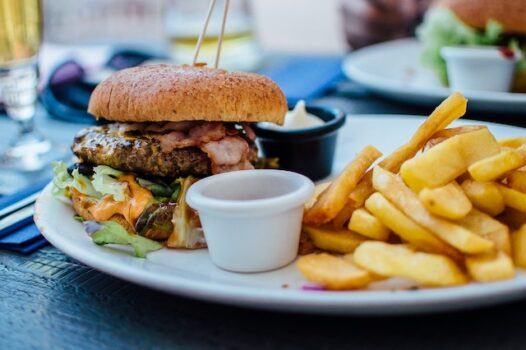Should Junk Food Be Banned in Schools?
A Real Talk About Kids, Junk Food, and School Life
As a parent and someone who’s passionate about food, I know how hard it is to say “no” to that packet of chips or candy bar your kid begs for before school. It’s easy. It’s cheap. It makes them happy (at least for a moment). But let’s be honest—just because something is easy doesn’t mean it’s good.
The question of whether junk food should be banned in schools isn’t just about rules. It’s about protecting our kids’ health, their ability to focus, and the future habits they’ll carry for life.
What Is Junk Food, Really?
Junk food refers to highly processed snacks and meals loaded with salt, sugar, saturated fats, and little to no nutritional value. Think chips, sodas, candy bars, sugary cereals, and even some cafeteria foods that come out of a deep fryer instead of a kitchen.
These foods are designed to be addictive. That’s not just a theory—it’s backed by science. The mix of sugar, salt, and fat triggers pleasure centers in the brain, making us crave more.
The Real Effects of Junk Food on Students
Sure, a candy bar once in a while won’t hurt. But daily exposure? That’s where the real damage begins.
Here’s what regular junk food consumption can do to kids:
-
Increases risk of obesity
-
Raises blood pressure and bad cholesterol
-
Leads to hormonal imbalances
-
Reduces focus and concentration
-
Weakens the immune system
-
Creates long-term dietary habits that are hard to break
Many people talk openly about addictions like smoking and alcohol, but we don’t talk enough about fast food addiction—especially in children.
Why Schools Should Lead the Change
Schools aren’t just about math tests and homework—they’re where habits are formed. If we fill our school cafeterias and vending machines with processed snacks, we’re sending a message that these foods are okay.
Banning junk food in schools doesn’t mean your child can’t ever eat a cookie again. It just means that schools will no longer promote or sell unhealthy food on a daily basis.
This doesn’t ban birthday cupcakes or lunchbox treats from home. And yes, school bake sales can still happen—they’re occasional, not daily.
Benefits of a Junk Food Ban in Schools
Let’s flip the coin and look at the long-term benefits of banning junk food in schools:
Healthier Kids, Inside and Out
-
Fewer cases of childhood obesity
-
Reduced risk of diabetes and heart disease
-
Improved energy levels
-
Better focus and performance in class
-
Stronger immunity and less frequent illness
Improved Learning Environment
Kids who eat better learn better. It’s that simple. A nutritious meal fuels the brain and keeps kids alert. Meanwhile, sugar crashes from candy bars leave them sleepy, moody, and distracted.
Better Eating Habits at Home
When schools take a stand, it often influences what happens at home. Kids start to recognize the difference between real food and processed junk. And that awareness matters.
But Wait… Isn’t It the Parents’ Job?
Absolutely. But schools play a huge supporting role in raising healthy, informed kids. Saying “junk food has no place in school” isn’t about overstepping parental rights—it’s about aligning environments.
When parents and schools work together, that’s when real change happens.
A Note on Convenience and Affordability
Many people argue that junk food is cheaper and easier to pack. And while that may be true short-term, let’s talk long-term:
-
A bag of fruit costs less than a box of sugary cereal bars over a week.
-
Homemade sandwiches with whole grain bread and simple fillings are both filling and nutritious.
-
Water is free and better than any soda.
It’s about a mindset shift—and yes, it takes effort—but your child’s health is more than worth it.
Final Thoughts: It’s Not About Perfection, It’s About Progress
This isn’t about turning every child into a salad-loving health nut overnight. It’s about small steps that lead to big changes. Start by swapping one junk snack with a healthy option. Celebrate effort, not just results.
And remember—banning junk food in schools doesn’t eliminate freedom. It creates a healthier foundation.
We owe it to our children to give them the best shot at a healthy, happy life. Let’s start by cleaning up what’s in their schools—and in their lunchboxes.


